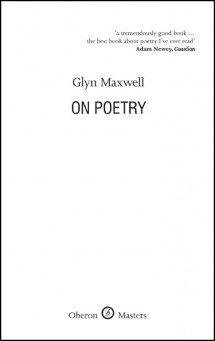Blog
Monthly Archive: December 2012
On Poetry, the body, and the earth
Posted on Monday, December 10, 2012
 |  |  |
As work on The Firework Maker's Daughter developed, so too did my sense of artistic kinship with my librettist Glyn Maxwell. A sense of the considerable overlap in our aesthetic outlook has only been heightened by my reading of his new book On Poetry where Glyn talks incredibly engagingly about how poetry works.
The book in many ways was one of the best composition lessons I've ever had, and I may talk about more of it in a subsequent post, but the aspect I'd like to discuss here is that of the relation of the art to the act of 'being human'. For a poem to be successful, Glyn argues that it must coherently express a human presence. He's talking about something very different from the poet 'expressing his emotions', it's more to do with the way the work of art manages to conjur that palpable sense of someone being there. There are all sorts of ways this can be achieved of course - a person might be there, but in hiding; or trying to draw attention away from themselves; and of course people can have contradictory traits, but still have a coherent presence.
The heartbeat, the breath, the laugh, the cry, the step, the spoken word; these are all some of the essential starting points of music, and I do believe much of music's mysterious power can be traced to its origins in these elemental aspects of being human; just as Glyn argues that dealing with them in a poem are a crucial part of creating that sense of a coherent human presence.
I'm not sure Glyn's view of poetry translates directly to music, but I certainly think the connection between music and the physical body is very important, and one very much to the forefront of my mind when I write. Many of the 'traditional' uses of music - the lament, the celebration, the dance, the work-song - stem from physicality, and I feel sure, to adapt John Adams's phrase, that music that strays too far from that physicality is likely to atrophy.
For me, there is one other aspect which is equally important, and that is the relation to the physical world, to the earth. Where most popular music will deal exclusively with the physical - with the body - the most interesting music to me, the work whose scale and ambition I strive to match, are in touch with the connection to both the body and the earth. A Beethoven symphony does this, it is shot through with the dance, but it also looks to the horizon and roots the dance in a landscape. So too does Sibelius, perhaps his music is more connected to the body via the cry than the dance, but his human presence is inescapably connected to a windy Nordic landscape.
So although many of my rhythmic preoccupations are rooted in the physicality of popular music, I try to look beyond that for this connection with the earth. In the opening scene of Act 2 of The Firework Maker's Daughter, Lila the heroine is facing the full-force of mother nature as she attempts to reach the heart of the 'Mountain of fire'. I realise, looking at it now, that the music contains both the heart-beat of the heroine, as well as the awesome terrifying thunder of twisting lava. Physical and elemental combine. Indeed, now I think about it, perhaps one of the main ways we connect to the earth is through a sense of awe - the lone figure contrasting with the might of nature.
To people who say that classical music is irrelevant to the modern world, that pop music is the new classical music, I say, perhaps you have forgotten your connection to the earth. Think no further than the ubiquitous role of amplification in pop music - even so-called 'unplugged' sessions. It's less a side-effect than a deliberate intention of amplification to hermitically seal the listener off from their connection to the earth. A modern, man-made bubble, every bit as counter-natural as the air-conditioning and double-glazing. (This dislike of amplification by the way, was part of the twisted logic behind my Steampunk piece).
Now I can see that what I am striving to achieve is to give the listener the sense of themselves and of the players sitting naked on this beautiful rock we call home, to unmask the reality that lies underneath the layers of clothing, the comfortable seats and the insulated building. Because music deals with these fundamentals, it's pre-historic, it's pre-language, it speaks to that part of us which we spend most of our days avoiding - the part Glyn describes as "ourselves before language, hiding or hunting on that lonely bright savannah".

